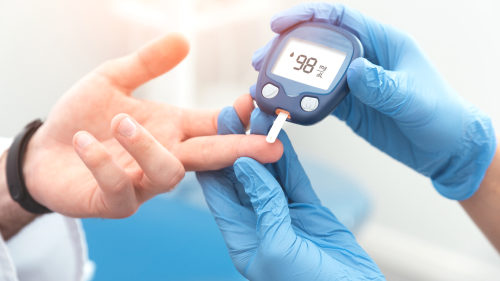In order to understand the dangers of addiction in people diagnosed with diabetes, it is first important to gain a broad understanding of diabetes. The American Diabetes Association (ADA) explains that diabetes is a long-term condition that arises from disordered glucose functioning in the body. In order for cells to function in the body, they require a certain amount of glucose. There are two main types of diabetes: type I and type II. Type I diabetes usually occurs in children and young adults. The immune system of an individual with type I diabetes basically destroys the beta cells in the pancreas that produce insulin (hormone that controls the level of glucose in the blood). Without beta cells the pancreas cannot make insulin, which in turn leaves the individual with type I diabetes with little to no insulin in his or her body. With type II diabetes, while the beta cells in the pancreas do produce insulin the amount produced is insufficient for adequate glucose functioning, or the body’s insulin receptors resist glucose, prohibiting glucose from entering the cells. When glucose is unable to get into the cells, the cells become undernourished and unable to function optimally, and further, the excess glucose will begin to buildup in one’s bloodstream that results in high blood sugar. There is no cure for diabetes, but its symptoms can be managed with proper and consistent medical care.
Addiction, also known as substance use disorder, is listed in the Diagnostic and Statistical Manual of Mental Disorders, Fifth Edition (DSM-5) as a chronic brain disorder. It is characterized by compulsively engaging in rewarding stimuli (e.g. abusing drugs) without regard for consequence. When an individual struggles with addiction he or she will prioritize satisfying his or her drug and/ or alcohol cravings above all else. This can greatly interfere with one’s ability to sufficiently care for him or herself with regard to diabetes, which can lead to dangerous consequences. Individuals diagnosed with diabetes that struggle with addiction and engage in active substance abuse are at increased risk for developing one or more of the following examples:
- Severe hypoglycemia (low blood sugar)
- Hyperglycemia (high blood sugar)
- Diabetic ketoacidosis (diabetic coma)
Every drug has unique characteristics and will affect each individual differently. Regardless of the substance abused there are certain side effects that are relatively universal, such as irregular sleep, impaired mental functioning (e.g. forgetfulness), lack of coordination, and more. Many of which can unfortunately exacerbate one’s diabetic condition. Remaining vigilant and strictly adhering to one’s diabetes treatment is essential to one’s health and overall wellbeing.
For Information and Support
If you are concerned for yourself or a loved one in regards to substance abuse and/ or addiction we recommend reaching out for help as soon as possible. If left untreated, substance abuse can result in long lasting and potentially life-threatening consequences. Keep in mind: you are not alone! There is an entire network of professionals that are available to help and support you and your loved one throughout the recovery process. The earlier you seek support, the sooner your loved one can return to a happy, healthy, and fulfilling life.
Please do not hesitate to reach out with any questions regarding our specific program at Haven House Addiction Treatment and/ or general substance abuse and/ or addiction treatment related information. Our highly trained staff is readily available to discuss how we might best be able to help you and your loved one. We can be reached by phone at 424-258-6792. You are also welcome to contact anytime us via email at admissions@hhtxc.com.



